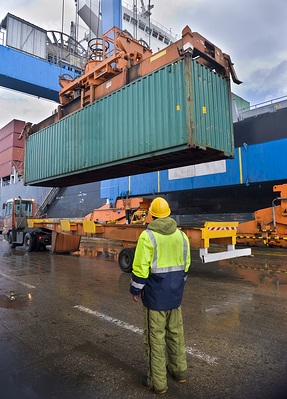 Five to ten days: that’s how long we have until West Coast ports completely shut down, according to the Pacific Maritime Association (PMA).
Five to ten days: that’s how long we have until West Coast ports completely shut down, according to the Pacific Maritime Association (PMA).
Two days ago, we posted a shipping news alert warning shippers to prepare for a shutdown. Now the warning is coming from the PMA.
In the midst of the nine-month-long contract negotiations between the PMA and International Longshore & Warehouse Union (ILWU), congestion and productivity at the West Coast ports has already been devastatingly costly for shippers who depend on the ports to import and export for their businesses.
Now it looks like the ports will grind completely to a halt… unless…
Yes, there is a hope that international shipping through West Coast ports won’t completely stop.
The PMA has made an “all-in” contract offer to the ILWU. There’s an ultimatum involved. Accept the contract, ILWU, or the ports will shut down.
The PMA has had enough of these negotiations with the union, saying the ILWU’s slowdowns to gain leverage are having the same effect on the ports as a strike but workers are still getting paid.
“Now, the PMA must decide how much longer we are going to pay longshore workers to work slowly. These slowdowns are having the same result as a workers strike, except that workers are still getting a paycheck,” says PMA President James C. McKenna.
Bottom line from McKenna is, “The slowdowns need to stop. The terminals cannot withstand anymore.”
Here’s a video the PMA released of McKenna addressing the situation, presenting a contract, and laying out that the West Coast ports are on the verge of complete meltdown if the ILWU does not accept the contract and things continue as they have been:
This new contract, which the PMA has concluded “is as far as we can go at this point” includes the following according to the PMA’s press release:
Full-time ILWU workers already earn an average of $147,000 per year, and would see their wages rise roughly 3 percent per year, along with fully paid health care that costs employers $35,000 per worker per year. The maximum ILWU pension would rise to $88,800 per year as part of the proposed five-year contract.
…
PMA’s offer also meets the ILWU’s two biggest demands: maintenance of their Cadillac health benefits – which feature no worker premiums, no co-pays and no deductibles for in-network benefits– as well as jurisdiction over maintenance and repair of truck chassis. Those two issues consumed months of contract talks, and in both cases PMA has offered significant concessions to the ILWU.
The resulting contract offer calls for a cost increase of roughly five percent each year over the life of the five-year contract.
The PMA offered the following graphs to demonstrate orchestrated slowdowns by the ILWU at West Coast ports:
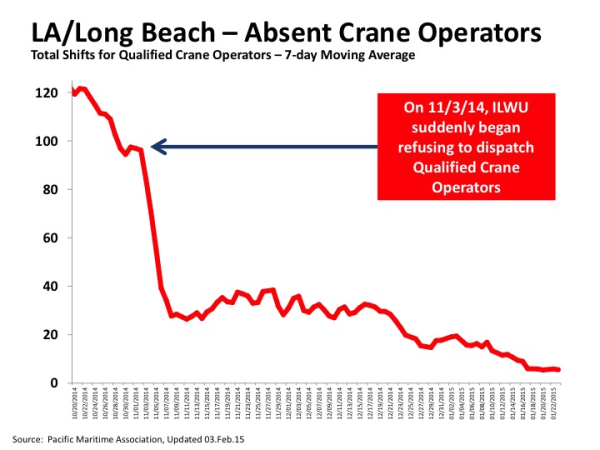
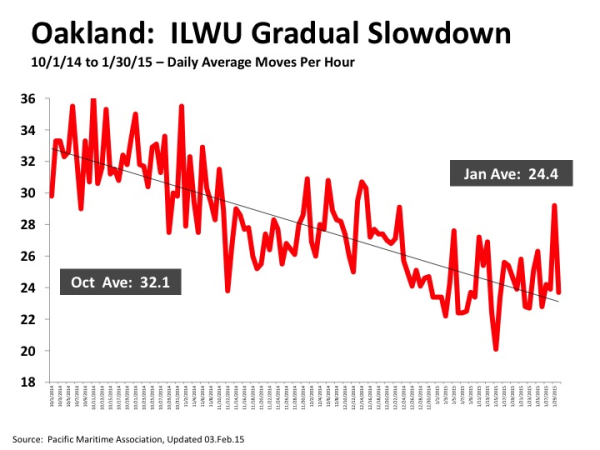
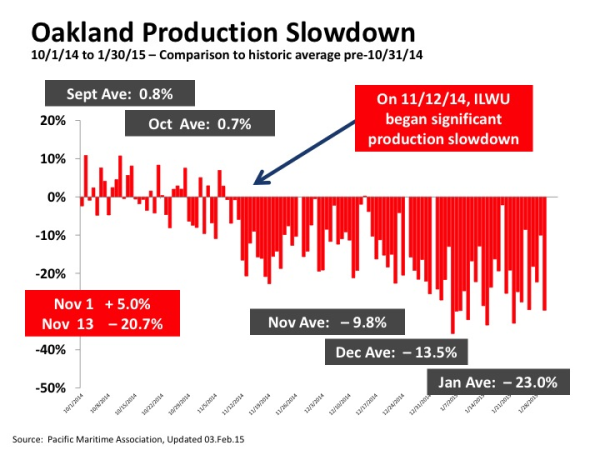
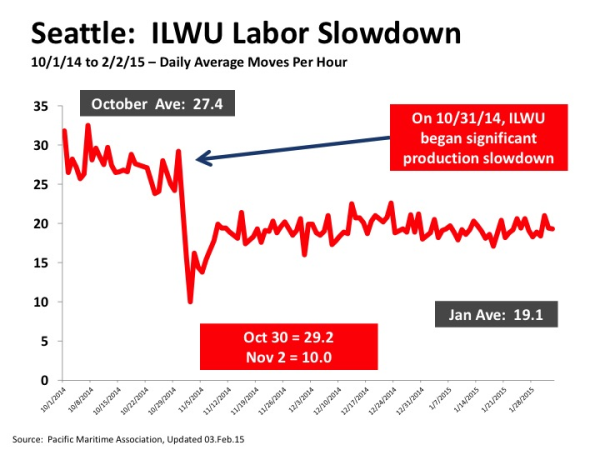
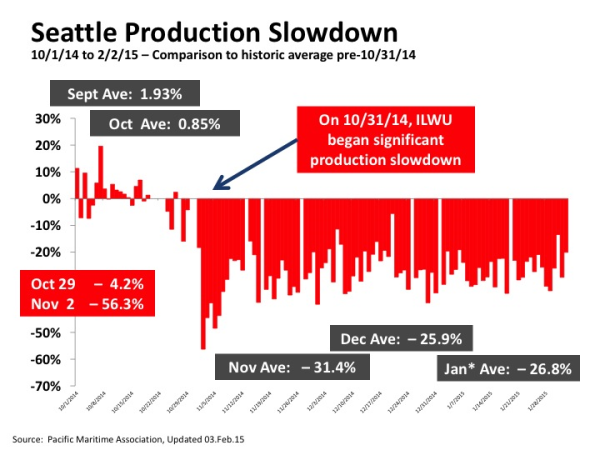
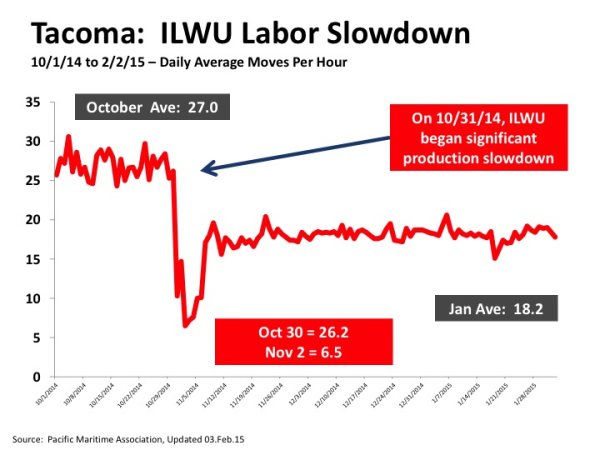
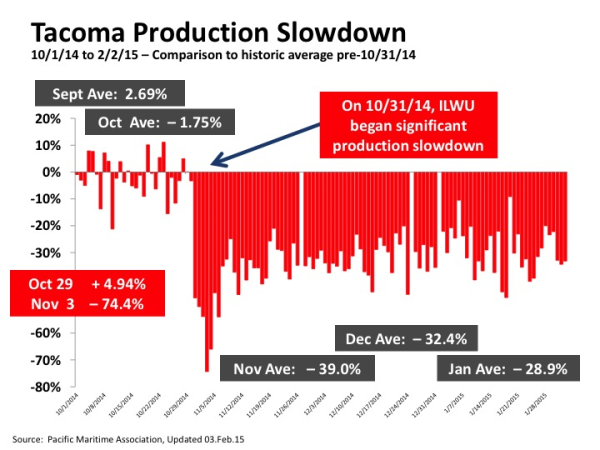
Of course, the ILWU has denied orchestrating slowdowns.
The union does not appear to be agreeing to the new contract.
The ILWU has responded with an article that has a headline which reads: “ILWU tells employers: Finish negotiations, don’t close ports over only a few remaining issues.”
According to the ILWU, and their article, the negotiations are close:
The ILWU is trying to keep dock employers at the negotiating table to finish an agreement that is “extremely close.”
“We’re this close,” said ILWU President Robert McEllrath, who held up two fingers in a gesture indicating how close the parties are to reaching an agreement.
“We’ve dropped almost all of our remaining issues to help get this settled – and the few issues that remain can be easily resolved.”
Reading PMA’s press release does not give the feeling of the last few issues being so easily resolved or that the ILWU is dropping issues. It says the ILWU is adding issues:
The Union has recently made significant new demands, and is also insisting on changes to the decades-long process for selecting arbitrators – trying to change the rules on the waterfront in their favor, giving them the ability to unilaterally remove arbitrators who rule against them.
Certainly, from watching the negotiations drag on and on, it does not seem like the parties are able to easily resolve any issues.
What we’re left with now are ports that have been moving terribly slowly in the midst of awful congestion on the brink of completely shutting down.
The PMA has a contract on the table, with wages and benefits that most Americans would love to have, that the ILWU could sign and we could move toward getting the ports running again. The ILWU seems to be saying, not good enough; we want more.
As the ports are about to shut down, both sides blame the other. In the meantime, shippers and the economy suffer.
